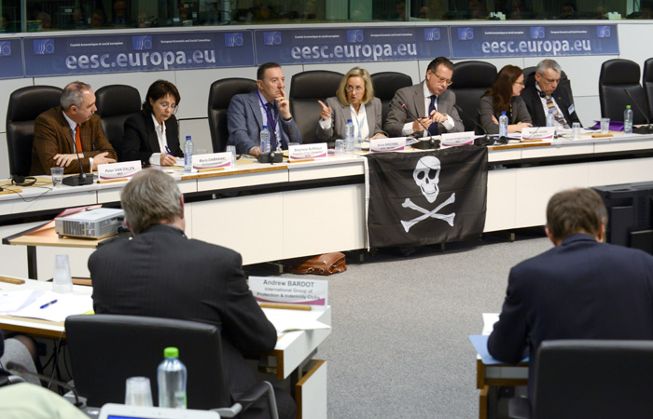
January 2013
The European Economic and Social Committee recently released a recommended strategy to find a permanent end to the problem of piracy in the Indian Ocean.
The European Economic and Social Committee (EESC) is a body of the European Union that acts in an advisory capacity. It represents employers, employees and various interest groups. The EESC recently organized a hearing on the topic of piracy, where officials and interested parties were able to participate in the discussion.
Dr. Anna Bredima of Greece, the Vice-President of the EESC’s Employers Group, shared the overall opinion of the committee on the subject: “Piracy is not only a maritime problem. It is also a humanitarian, trade and global one, affecting consumers and taxpayers around the world.”
“The EU needs to come up with an appropriate mix of the tools it has at its disposal: trade and development aid, military presence, reconstruction and capacity-building,” she elaborated.
Experts have estimated that piracy costs the global economy approximately $7 billion per year. Nearly 20,000 ships travel through at-risk waters. The recent hotbed for piracy, the Indian Ocean, sees a large percentage of the world’s oil and cargo containers travel through its waters each year.
The European Union (EU) has a vested interest in addressing the issue, as the countries that make it up account for 40% of the world’s shipping by volume.
EESC Commissioner, Maria Damanaki, informed attendees of the hearing that the commission was in the process of creating a new EU security strategy that encompasses the global maritime domain. The first goal of the process is to help establish real-time situational awareness of all activities at sea.
This ambitious goal would be achieved by improving information sharing and cooperation not only between countries, but also between military and civilian spheres. The more information is more widely shared, the easier it is for those in important positions to make tough decisions.
While recent efforts from the slew of international naval coalitions have greatly reduced the number of pirate attacks, high ranking members of the commission made it clear that they know this is not a permanent solution. The suggestions made by the commission specifically include capacity building of regional states, as well as the rebuilding of Somalia itself. The rebuilding effort includes providing economic recovery such that direct incentives could be offered to keep Somalis out of piracy.
Another specific measure focuses on shifting the prosecution and pursuit from the now common foot soldiers of piracy to the ones who are actually pulling the strings. Like most criminal organizations, the ones financing and planning the missions are rarely involved in their direct operation. For that, they rely on the seemingly endless supply of desperate Somali youth that are convinced to join pirate organizations.
To achieve this, the EU and other international partners would need to focus on disrupting the financial networks of the pirate-bosses. The money must come from somewhere and go somewhere– a greater effort is needed to track the flow of money to and through pirate organizations, dealing harsh sanctions to those who launder or handle pirate-money. Some money may have even been laundered or deposited in EU banks, the commission said. Finding which institutions are participating would be a key step.
Finally, the EESC endorsed the use of qualified private maritime security contractors aboard their vessels. While extraordinarily effective at deterring pirate attacks, the EESC did warn that the contractors and the firms that employ them need to be held to strict international and EU regulation.